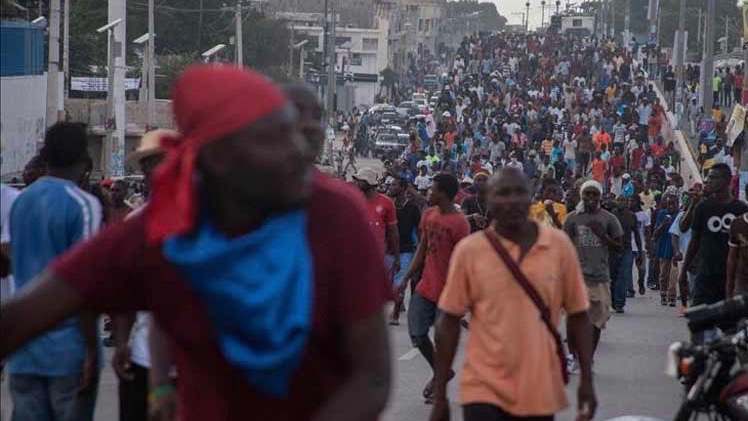On February 28, for the third consecutive Sunday, Haitians mobilized en masse against the dictatorship of Jovenel Moïse and the interference of the imperialist forces that prop up his regime. Hundreds of thousands of people took to the streets across Haiti to demand that Moïse respect the constitution and step down, and that the international community respect the self-determination and sovereignty of the Haitian people.
In the capital, Port-au-Prince, a large number of citizens, students, workers, women and members of various civil society organizations and opposition political parties, peacefully marched through important avenues and streets for about five hours to express their rejection of Moïse’s illegal overstay in office. Many demonstrators wore white clothes to demand a peaceful transition of power to the interim government. Some dressed in national flags’ blue and red bicolor clothes, demanding respect for the constitution and democracy.
Massive protests today in #Haiti's capital demanding an end to the nightmare regime of @moisejovenel & condemning #Biden's @StateDept & @UN for propping up what protesters are openly calling a dictatorship. pic.twitter.com/35ZUKef3qR
— HaitiInfoProj (@HaitiInfoProj) February 28, 2021
Similar massive and peaceful demonstrations demanding an immediate end to Moïse’s de-facto rule were also held in the cities of Cap-Haïtien, Les Cayes, Jacmel, Grand-Goâve, Léogâne and Mirebalais, among others.
In Port-au-Prince, several places remained heavily guarded by the officials of the Haitian National Police (PNH). In some places, the police tried to obstruct the passage of protesters, but eventually allowed them to continue marching. Towards the end of the demonstration at the Champ de Mars public square, the security agents repressed the protesters with tear gas and water canons, which caused panic among the people.
More images from #Haiti's capital today as tens of thousands took to the streets to demand @moisejovenel step aside and allow for a govt of national unity to end to violence and organize new free & fair elections. pic.twitter.com/vY4aOVgirM
— HaitiInfoProj (@HaitiInfoProj) March 1, 2021
According to the Caribbean country’s constitution, Moïse’s presidential term ended on February 7. However, he has refused to leave power, alleging that there have been discrepancies in the interpretation of the constitution, a claim that has been disapproved by the country’s legal entities such as Haiti’s Superior Council of the Judiciary (CSPJ) and the Federation of Haitian Lawyers (FBH).
Virtually, all sectors of the nation -social, political opposition, institutional, even religious- have expressed themselves against Moïse’s dictatorship and are demanding his resignation. The majority of the people and the opposition are demanding that Moïse hand over power to the transitional government of Supreme Court Judge Joseph Mécène Jean-Louis. Jean-Louis was appointed as the interim president on February 8 by the Haitian opposition forces and has the support of the country’s civil society organizations. His government will administer the country for the next two years and organize elections for the next government, according to the proposal agreed between various social and political organizations.
Despite the widespread rejection of Moïse’s de-facto rule and his decisions to illegally redraft the current constitution and call for elections in September 2021, his illegitimate government and its decisions have received the support form the “Core Group,” composed of the ambassadors of Brazil, Canada, France, Germany, Spain, the European Union, the United States of America, as well as representatives from the United Nations and the Organization of American States.
Various international solidarity initiatives are calling on governments part of the Core Group to withdraw support for Moïse. Several organizations are also calling on the international human rights organizations to denounce and regulate the brutal repression by state security forces, the use of live bullets against the demonstrators, the attack on journalists and other human rights violations, which have increased considerably in recent weeks.





